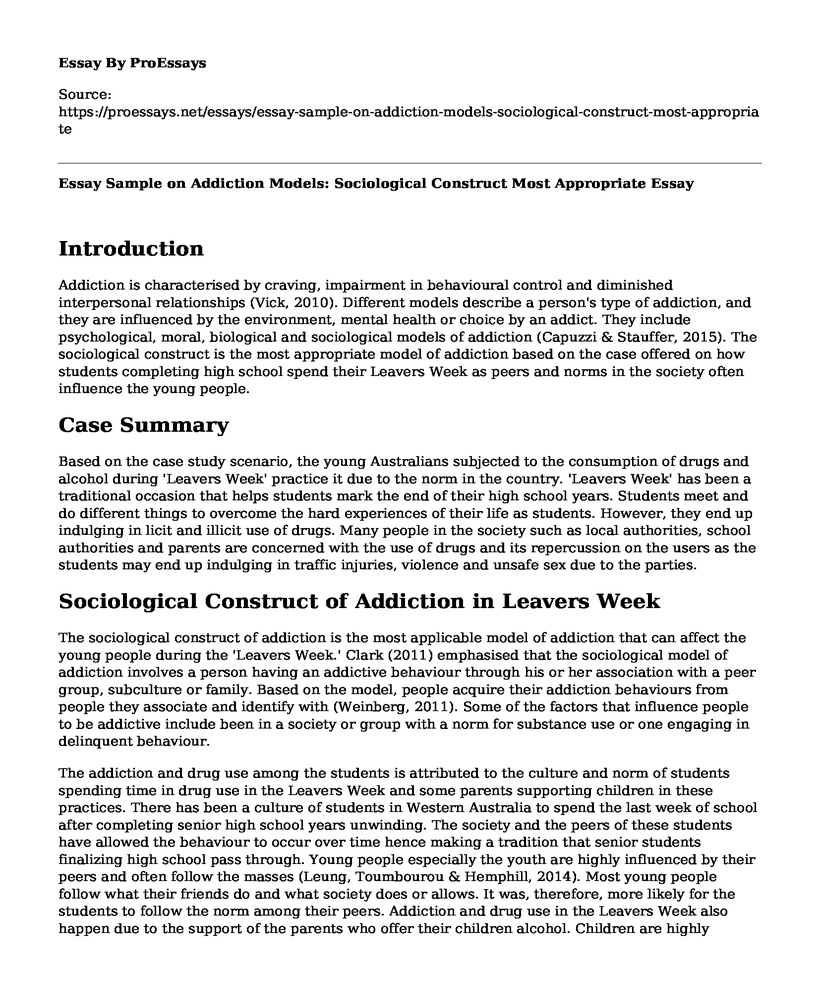Introduction
Addiction is characterised by craving, impairment in behavioural control and diminished interpersonal relationships (Vick, 2010). Different models describe a person's type of addiction, and they are influenced by the environment, mental health or choice by an addict. They include psychological, moral, biological and sociological models of addiction (Capuzzi & Stauffer, 2015). The sociological construct is the most appropriate model of addiction based on the case offered on how students completing high school spend their Leavers Week as peers and norms in the society often influence the young people.
Case Summary
Based on the case study scenario, the young Australians subjected to the consumption of drugs and alcohol during 'Leavers Week' practice it due to the norm in the country. 'Leavers Week' has been a traditional occasion that helps students mark the end of their high school years. Students meet and do different things to overcome the hard experiences of their life as students. However, they end up indulging in licit and illicit use of drugs. Many people in the society such as local authorities, school authorities and parents are concerned with the use of drugs and its repercussion on the users as the students may end up indulging in traffic injuries, violence and unsafe sex due to the parties.
Sociological Construct of Addiction in Leavers Week
The sociological construct of addiction is the most applicable model of addiction that can affect the young people during the 'Leavers Week.' Clark (2011) emphasised that the sociological model of addiction involves a person having an addictive behaviour through his or her association with a peer group, subculture or family. Based on the model, people acquire their addiction behaviours from people they associate and identify with (Weinberg, 2011). Some of the factors that influence people to be addictive include been in a society or group with a norm for substance use or one engaging in delinquent behaviour.
The addiction and drug use among the students is attributed to the culture and norm of students spending time in drug use in the Leavers Week and some parents supporting children in these practices. There has been a culture of students in Western Australia to spend the last week of school after completing senior high school years unwinding. The society and the peers of these students have allowed the behaviour to occur over time hence making a tradition that senior students finalizing high school pass through. Young people especially the youth are highly influenced by their peers and often follow the masses (Leung, Toumbourou & Hemphill, 2014). Most young people follow what their friends do and what society does or allows. It was, therefore, more likely for the students to follow the norm among their peers. Addiction and drug use in the Leavers Week also happen due to the support of the parents who offer their children alcohol. Children are highly expected to behave the way their parents allow them to do in public hence if their parents allow them to use alcohol in the Leavers Week, it is likely that use of alcohol is one of the norms in these parents' homes (Van Ryzin, Fosco & Dishion, 2012). Therefore, the custom and culture of some parents and students supporting the use of alcohol among other drugs during the Leavers Week highly influence the ability of young people to engage in any events linked to drug use and addiction.
Conclusion
In conclusion, sociological construct of addiction is an approach that refers to how the society or a person's acquaintances influence one's behaviour. Most of the students attending parties during Leavers Week indulge in drug and alcohol use due to peer pressure and some parents supporting the act. All adults within the society should preach against the acts to ensure young people do not indulge in behaviours that can adversely affect their future.
References
Capuzzi, D., & Stauffer, M. D. (2015). Foundations of couples, marriage, and family counseling. Hoboken, New Jersey: Wiley
Clark, M. (2011). Conceptualising addiction: How useful is the construct. International Journal of Humanities and Social Science, 1(13), 55-64.
Leung, R. K., Toumbourou, J. W., & Hemphill, S. A. (2014). The effect of peer influence and selection processes on adolescent alcohol use: a systematic review of longitudinal studies. Health psychology review, 8(4), 426-457.
Van Ryzin, M. J., Fosco, G. M., & Dishion, T. J. (2012). Family and peer predictors of substance use from early adolescence to early adulthood: An 11-year prospective analysis. Addictive behaviors, 37(12), 1314-1324.
Vick, D. (2010). Drugs and Alcohol in the 21st Century: Theory, Behavior, and Policy. Jones & Bartlett Learning.
Weinberg, D. (2011). Sociological perspectives on addiction. Sociology Compass, 5(4), 298-310.
Cite this page
Essay Sample on Addiction Models: Sociological Construct Most Appropriate. (2023, Jan 03). Retrieved from https://proessays.net/essays/essay-sample-on-addiction-models-sociological-construct-most-appropriate
If you are the original author of this essay and no longer wish to have it published on the ProEssays website, please click below to request its removal:
- Research Paper on Health Care Needs of Bronx-NY Community
- Essay Example on Racial Discrimination and Other Sociological Issues in America
- Power Vacuums and Violence Essay
- Argumentative Essay on Immorality of Sexism
- Critical and Creative Thinking in the Society Essay
- Investigating Sex Crimes Paper Example
- What Does It Mean to Be a US Citizen - Essay Sample







